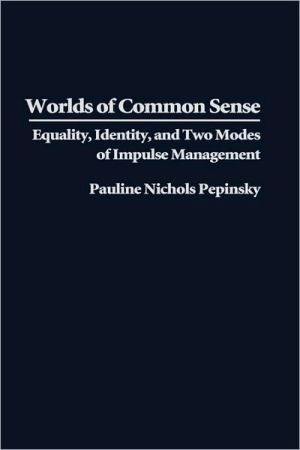

 |

|

The average rating for Worlds of Common Sense: Equality, Identity, and Two Modes of Impulse Management, Vol. 26 based on 2 reviews is 3.5 stars.
Review # 1 was written on 2019-12-21 00:00:00 Francis Ellis Francis EllisYou might think that reading about a series of Supreme Court cases ostensibly dealing with tariffs and the newly acquired colonies of Puerto Rico, Guam, Cuba & the Philippines would be boring...well, it's not the most riveting reading, but it is well written, well researched and very thoughtful. I actually enjoyed reading this for my research, unlike a lot of books written about the Constitution, law, and the treatment of various indigenous people. If this is your area (post-colonial studies, American empire, Constitutional law and citizenship), then this is an invaluable resource. |
Review # 2 was written on 2019-03-07 00:00:00 Mark Roche Mark RocheA thoroughly disappointing look at some of the strangest cases ever to come to the U.S. Supreme Court. The "Insular Cases," begun in 1901 and continuing until 1922, dealt with the seeming imponderable question of how the United States Constitution, coming out of a republic founded on an anti-colonial revolt, applied to a colonial empire acquired from Spain (as well as from the Hawaiian monarchy and the German and Danish governments (who sold the US American Samoa at the same time)). The only real clause in the Constitution that the Supreme Court could hang its hat on in the Insular Cases was the "territorial clause" in Article IV, which the Supreme Court last wrestled with in Dred Scott v. Sanford and the run-up to the Civil War. In the antebellum period, the Court had upheld pretty expansive congressional authority over the colonies. Chief Justice Marshall in American Insurance Company v. Canter (1819) said that any ports acquired by treaty would be treated as foreign "until they are established as domestic by an Act of Congress." In Fleming v. Page (1850), Chief Justice Roger Taney said that cargo shipped from Mexico could be treated as imports by the Polk administration, even though the US occupied the land at the time. In Murphy v. Ramsey (1872) the Court said that the government could disenfranchise people in Utah Territory for polygamy, despite the 15th amendment. Thus in the first main case, Downes v. Bidwell (1901), a divided court said that Congress could impose tariffs on goods imported from "Porto Rico," despite the annexation of the islands by treaty. Henry Billings Brown, a Harvard Law- educated Detroit US District judge steeped in admiralty law, gave the majority opinion, explaining that the Dred Scott decision about Constitution applying in the territories was dicta and against the vast majority of Supreme Court decisions. Brown said artificial rights, like the right to a jury, had no application unless Congress extended them, but "certain principles of natural justice inherent in the Anglo-Saxon character" like freedom of worship and speech, personal liberty and property, due process, immunities from searches and seizures, and "other immunities" did naturally extend. Justice Edward White wrote a concurring decision, joined by three other justices, that said that only if a territory was "incorporated" by treaty did any rights extend, and the 1899 Treaty of Paris did not "incorporate" Porto Rico. (He cribbed from Abbot Lawrence Lowell's Harvard Law Review article about the upcoming cases that suggested this previously unknown distinction). Chief Justice Fuller joined with three dissenters to say that all of the Constitution ex proprio vigor followed the flag, and claimed that this was a clear corruption of the republic. Over the next few years, the court was often split 5-4, and Henry Billings Brown was the swing. In DeLima v. Bidwell, Brown sided with the previously dissenting four justices, and said that since Porto Rico was transferred by treaty first, it could not impose tariffs before Congress decided to do so. He also decided that the territories were effectively part of the US sometimes (like for coasting regulations in Huus v. New York Steamship Company). In other cases, like Gonzalez v. Williams (1904), the Court decided that Porto Ricans were not "aliens" under the immigration laws, and so couldn't be stopped at port. Slowly, however, the Court adopted White's "incorporation" doctrine, and left the islanders with very little in way of rights that could not be taken over by Congress. Unfortunately, the author of this book seems to have little understanding about whether the Court ruled based on statutory or constitutional clauses, on why certain distinctions about territories were important or not, and how the Insular Cases fit into the broad stretch of American constitutional law. The book thus took a fascinating story, covered it in minutiae, and failed to pull a coherent narrative out of it. There probably is a better version out there. |
CAN'T FIND WHAT YOU'RE LOOKING FOR? CLICK HERE!!!